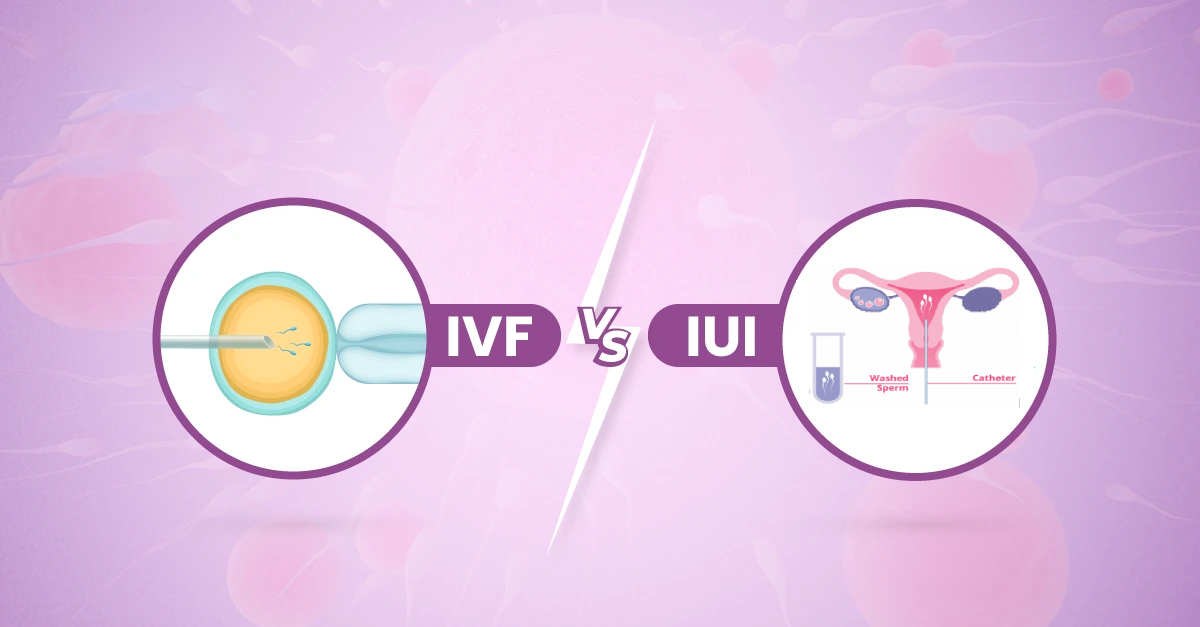Choosing between IUI and IVF is one of the most common questions patients ask at our Panchkula and Chandigarh clinics. This short introduction helps Google understand the page better and gives local context for indexing.

IVF vs IUI: visual comparison of two major fertility treatments.
The Difference Between IUI and IVF: A Complete, Expert-Backed Guide
Infertility affects nearly 15–18% of couples in India (WHO). Because this challenge is becoming more common, many couples try to understand the exact difference between IUI (Intrauterine Insemination) and IVF (In Vitro Fertilization). Although both treatments aim to help with conception, they work in completely different ways and therefore suit different medical conditions.
To simplify this decision, this guide follows the structured approach used by Dr. Nitasha Gupta – Consultant Gynecologist & IVF Specialist. She treats infertility, PCOS, endometriosis, recurrent pregnancy loss, and hormonal issues across Panchkula, Chandigarh, Mohali & Dera Bassi. As a result, this article is clear, medically accurate, and aligned with trusted global standards such as ASRM, CDC, and WHO.
What Is IUI?
IUI is a simple and minimally invasive fertility treatment. During this procedure, healthy, processed sperm is placed directly into the uterus close to the time of ovulation. Because the distance between the sperm and egg becomes shorter, the chances of natural fertilization increase significantly.
For detailed fertility treatments, visit our Fertility Services page.
To book a consultation with our gynecology team, click here:
Contact Dr. Nitasha Gupta.
How IUI Works
1. Sperm Preparation: The andrology lab chooses the healthiest sperm (PubMed reference).
2. Ovulation Monitoring: The doctor tracks ovulation using ultrasound scans, hormone blood tests, ovulation kits, or medications like Letrozole, Clomid, or low-dose gonadotropins.
3. Insemination: A thin catheter inserts sperm directly into the uterus. Because the process is quick and comfortable, most women resume daily activities immediately.
4. Aftercare: A pregnancy test is usually done after 14 days.
When Is IUI Recommended?
- Mild male infertility
- Low sperm motility
- Cervical mucus challenges
- Unexplained infertility
- Mild PCOS
- Donor sperm cycles
- Couples who prefer beginning with a simpler option
Helpful Internal Links
What Is IVF?
IVF is an advanced fertility treatment in which eggs are retrieved from the ovaries, fertilized in a laboratory, and then healthy embryos are transferred into the uterus. Because IVF bypasses several natural barriers, it offers considerably higher success rates than IUI.
How IVF Works
1. Ovarian Stimulation: Fertility injections stimulate the ovaries to produce multiple mature eggs.
2. Egg Retrieval: A short, painless procedure where eggs are collected using an ultrasound-guided needle.
3. Fertilization Methods:
- Conventional IVF: Eggs and sperm are cultured together.
- ICSI: A single sperm is injected directly into an egg, which is especially useful for severe male infertility.
4. Embryo Culture: Embryos grow in the lab for 3–5 days.
5. Embryo Transfer: One or more healthy embryos are placed into the uterus.
6. Pregnancy Support: Hormones help the uterine lining prepare for implantation.
Useful Internal Links for IVF Patients
When Is IVF Recommended?
- Repeated IUI failures
- Blocked or severely damaged fallopian tubes
- Severe male infertility
- Age above 35
- Moderate to severe endometriosis
- Low ovarian reserve
- PCOS unresponsive to medication
- Need for PGT-A / PGT-M
Key Differences Between IUI and IVF
1. Procedure Complexity
IUI is simple and quick, whereas IVF includes stimulation, retrieval, lab fertilization, and embryo transfer.
2. Success Rates
IUI: 10–20% per cycle
IVF: 40–70% per cycle depending on age (ASRM)
3. Cost
IUI: ₹7,000–₹10,000 per cycle
IVF: ₹1,00,000–₹2,00,000 per cycle
4. Suitability
IUI works well for mild infertility, whereas IVF is better for moderate to severe conditions.
5. Ovarian Stimulation
IUI usually uses mild stimulation, but IVF requires controlled ovarian hyperstimulation for higher egg yield.
Which Treatment Is Better?
IUI is recommended when:
- Younger age
- Mild infertility
- Open fallopian tubes
- A budget-friendly start is preferred
IVF is recommended when:
- Tubes are blocked
- Male infertility is severe
- 3–4 IUI cycles have failed
- Higher success is required quickly
Conclusion
Both IUI and IVF help couples achieve pregnancy; however, they differ in complexity, success rate, and cost. While IUI is affordable and less invasive, IVF offers far higher success rates and becomes essential for complex infertility cases. Because each couple’s fertility journey is unique, choosing the right treatment depends on age, medical history, and reproductive goals.
This comparison is specially prepared for patients seeking IUI and IVF treatment in Panchkula, Chandigarh, Mohali, and nearby areas.
To begin your personalized fertility plan, you can book an appointment with Dr. Nitasha Gupta.
Frequently Asked Questions (FAQs)
Q1. How many IUI cycles should I try before IVF?
Most specialists recommend 3–4 IUI cycles before switching to IVF.
Q2. Is IVF more successful than IUI?
Yes. IVF offers significantly higher success rates per cycle.
Q3. Is IUI painful?
No. IUI feels similar to a routine gynecological examination.
Q4. Who should choose IVF directly?
Couples with blocked tubes, severe male infertility, or low ovarian reserve.
Q5. Does IVF work for unexplained infertility?
Yes. IVF is highly effective because embryo development is closely monitored in the lab.






